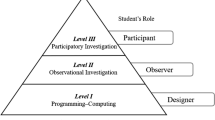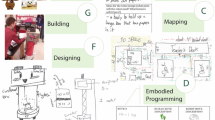Abstract
Robotics plays a key role in today’s digital systems. It influences every aspect of human life: daily work, home, industry, transport, aviation, etc. Thus, it is important to raise motivated and gifted generation of young programmers with abilities to create bridges between physical and digital worlds under robotics. Traditional learning in programming of robots cannot meet the needs of students with different capabilities as well as challenges raised by the industry. Inquiry-based learning gives a possibility to pose questions, challenges, and problems for students themselves, thus providing self-realization and self-awareness towards building and improving their abilities. Moreover, the methodology of inquiry-based learning gives well-structured active student-oriented inclusive education in programming of robots. This chapter presents state-of-the-art in programming of robots using inquiry-based learning under inclusive education umbrella. Additionally, the study provides with the application of inquiry-based teaching approaches for the first cycle students with focus on gifted students, their experience of learning; feedback is described in particular sections of this chapter. The evaluation of changes in the abilities of students, who learned programming of robots, which in the long-term period serves as numerical results, is presented in this chapter as well.
Access this chapter
Tax calculation will be finalised at checkout
Purchases are for personal use only
Similar content being viewed by others
References
Acar, O. A., & Tuncdogan, A. (2018). Using the inquiry-based learning approach to enhance student innovativeness: A conceptual model. Teaching in Higher Education, 24(7), 895–909. https://doi.org/10.1080/13562517.2018.1516636
Alteren, I. R. (2021). Effect of specificity of guidance on gifted children’s learning process, learning outcomes, mood and flow during inquiry-based learning in science education (Master’s thesis). University of Twente.
Attar, S. (2019). A design of gifted personality traits scale. International Journal of Learning and Teaching, 11(2), 49–59.
Bezen, S., & Bayrak, C. (2020). Teaching mechanical waves by inquiry-based learning. Journal of Baltic Science Education, 19(6), 875–892.
Blancas, M., Valero, C., Mura, A., Vouloutsi, V., & Verschure, P. F. M. J. (2020). “CREA”: An inquiry-based methodology to teach robotics to children. In M. Merdan, W. Lepuschitz, G. Koppensteiner, R. Balogh, & D. Obdržálek (Eds.), Robotics in education (pp. 45–51). Springer International Publishing. https://doi.org/10.1007/978-3-030-26945-6_4
Buerk, S. (2021). Inquiry learning models and gifted education: A curriculum of innovation and possibility. In Modern curriculum for gifted and advanced academic students (1st ed., pp. 129–170). Routledge. https://doi.org/10.4324/9781003236696
Čepič, M. (2018). Inquiry based learning of contemporary physics topics and gifted students. In The role of laboratory work in improving physics teaching and learning (pp. 203–215). Springer. https://doi.org/10.1007/978-3-319-96184-2_17
Chrysovalantis, K., & Drigas, A. (2020). S.T.E.M.: Inquiry-based learning and gifted education. Neurology and Neurobiology, 3(4), 1–5. https://doi.org/10.31487/j.NNB.2020.04.01
Coppelia Robotics. (2022). Robot simulator CoppeliaSim: Create, compose, simulate, any robot. https://www.coppeliarobotics.com/
Cyberbotics. (2022). Webots: Robot simulator. https://cyberbotics.com/
Dorier, J.-L., & Maass, K. (2020). Inquiry-based mathematics education. In Encyclopedia of mathematics education (pp. 384–388). Springer.
Efklides, A. (2019). Gifted students and self-regulated learning: The MASRL model and its implications for SRL. High Ability Studies, 30(1–2), 79–102.
Eltanahy, M., & Forawi, S. (2019). Science teachers’ and students’ perceptions of the implementation of inquiry-based learning instruction in a middle School in Dubai. Journal of Education, 199(1), 13–23. https://doi.org/10.1177/0022057419835791
Eppes, T., Milanovic, I., & Wright, K. (2020). Improving student readiness for inquiry-based learning: An engineering case study. IJOE, 16(1), 14. https://doi.org/10.3991/ijoe.v16i01.12051
Hamilton, E. R., Rosenberg, J. M., & Akcaoglu, M. (2016). The substitution augmentation modification redefinition (SAMR) model: A critical review and suggestions for its use. TechTrends, 60(5), 433–441.
Ibrohim, I., Sutopo, S., Muntholib, M., Prihatnawati, Y., & Mufidah, I. (2020). Implementation of inquiry-based learning (IBL) to improve students’ understanding of nature of science (NOS). AIP Conference Proceedings, 2215(1), 030005.
Ismail, M. J., Anuar, A. F., Yusof, R., Yon, N. F. M., & Peter, O. (2021). Exerting inquiry based learning method in improving gifted students’ music recorder skill. Quantum Journal of Social Sciences and Humanities, 2(2), 11–24.
Khalaf, B. K., & Zuhana, B. M. Z. (2018). Traditional and inquiry-based learning pedagogy: A systematic critical review. International Journal of Instruction, 11(4), 545–564.
Kırıcı, M. G., & Bakırcı, H. (2021). The effect of STEM supported research-inquiry-based learning approach on the scientific creativity of 7th grade students. Journal of Pedagogical Research, 5(2), 19–35.
KTU. (2018). Studijų apklausų organizavimo, vykdymo ir rezultatų analizės metodika. KTU. https://ktu.edu/wp-content/uploads/2016/08/Studiju-apklausu-metodika-2018-06.pdf
KTU. (2022). GIFTed. https://students.ktu.edu/ed-programmes/gifted/
Kukulska-Hulme, A., Lee, H., & Norris, L. (2017). Mobile learning revolution: Implications for language pedagogy. In The handbook of technology and second language teaching and learning (pp. 217–233). China Central Radio & TV University Press.
Lai, C.-S. (2018). Using inquiry-based strategies for enhancing students’ STEM education learning. Journal of Education in Science Environment and Health, 4(1), 110–117.
Lee, T. T., & So, W. W. (2015). Inquiry learning in a special education setting: Managing the cognitive loads of intellectually disabled students. European Journal of Special Needs Education, 30(2), 156–172.
Li, J. (2021). Discussion in Inquiry-Based Learning (IBL). International Journal of Education and Management, 6(3), 140.
Lintner, T., & Puryear, A. (2021). Inquiry-based learning for gifted students in the social studies classroom. In Teaching gifted children (1st ed., pp. 247–252). Routledge. https://doi.org/10.4324/9781003238638
Lyddon, P. A. (2019). A reflective approach to digital technology implementation in language teaching: Expanding pedagogical capacity by rethinking substitution, augmentation, modification, and redefinition. TESL Canada Journal, 36(3), 186–200.
McKimm, A. N. (2021). Inquiry-based pedagogy for inclusive classrooms (Masterʼs thesis). Bethel University. https://spark.bethel.edu/etd/760
Meirbekov, A., & Salikhanova, Y. (2021). Inquiry-based learning: Strategies and benefits. Вестник КазНУ. Серия Педагогическая, 67(2), 18–26.
Mutakinati, L., Anwari, I., & Kumano, Y. (2018). Analysis of students’ critical thinking skill of middle school through STEM education project-based learning. Jurnal Pendidikan IPA Indonesia, 7(1), 54–65.
Onsee, P., & Nuangchalerm, P. (2019). Developing critical thinking of grade 10 students through inquiry-based STEM learning. Jurnal Penelitian Dan Pembelajaran IPA, 5(2), 132–141.
Open Robotics. (2022). Gazebo simulator. https://gazebosim.org/home
Pala, F. K., & Mıhcı Türker, P. (2021). The effects of different programming trainings on the computational thinking skills. Interactive Learning Environments, 29(7), 1090–1100.
Phelps, V. A. (2022). Motivating gifted adolescents through the power of PIE: Preparedness, innovation, and effort. Roeper Review, 44(1), 35–48.
Puentedura, R. R. (2015). SAMR: A brief introduction. Unpublished. Retrieved from http://www.hippasus.com/rrpweblog/archives/2013/10/02/samr_abriefintroduction.pdf
Spronken-Smith, R., & Walker, R. (2010). Can inquiry-based learning strengthen the links between teaching and disciplinary research? Studies in Higher Education, 35(6), 723–740.
Taengkasem, K., Chookaew, S., Howimanporn, S., Hutamarn, S., & Wongwatkit, C. (2020). Using robot-based inquiry learning activities for promoting students’ computational thinking and engagement. In Proceedings of the 28th International Conference on Computers in Education, pp. 386–393.
VEX Robotics. (2022). VEXcode VR - Virtual robot. https://vr.vex.com/
Yadav, A., Gretter, S., Good, J., & McLean, T. (2017). Computational thinking in teacher education. In P. J. Rich & C. B. Hodges (Eds.), Emerging research, practice, and policy on computational thinking (pp. 205–220). Springer International Publishing. https://doi.org/10.1007/978-3-319-52691-1_13
Zweers, I., Huizinga, M., Denessen, E., & Raijmakers, M. (2019). Inquiry-based learning for all: A systematic review of the effects of inquiry-based learning on knowledge, skills, attitudes and behavior of students with social-emotional and behavioral difficulties in primary and secondary education. https://doi.org/10.31219/osf.io/z45jt
Acknowledgments
The application of new learning methodologies and sharing of teaching experience during the lectures in Kaunas University of Technology, Lithuania has been supported during the process of academic mobility between teachers from Lithuania and Latvia, which was funded by Nordplus Higher Education funds (Nordic Council of Ministers) in the project NPHE-2021/10241 “Advanced Approach for Computer Control of Electrical Technologies”.
Author information
Authors and Affiliations
Corresponding author
Editor information
Editors and Affiliations
Rights and permissions
Copyright information
© 2022 The Author(s), under exclusive license to Springer Nature Switzerland AG
About this chapter
Cite this chapter
Bruzgiene, R., Narbutaite, L., Adomkus, T., Pauliute, J., Kunicina, N. (2022). Inquiry-Based Learning Focused on Inclusive Education in Programming of Robots: Challenges, Experience, and Feedback of First Cycle Students. In: Daniela, L. (eds) Inclusive Digital Education. Educational Communications and Technology: Issues and Innovations. Springer, Cham. https://doi.org/10.1007/978-3-031-14775-3_5
Download citation
DOI: https://doi.org/10.1007/978-3-031-14775-3_5
Published:
Publisher Name: Springer, Cham
Print ISBN: 978-3-031-14774-6
Online ISBN: 978-3-031-14775-3
eBook Packages: EducationEducation (R0)




